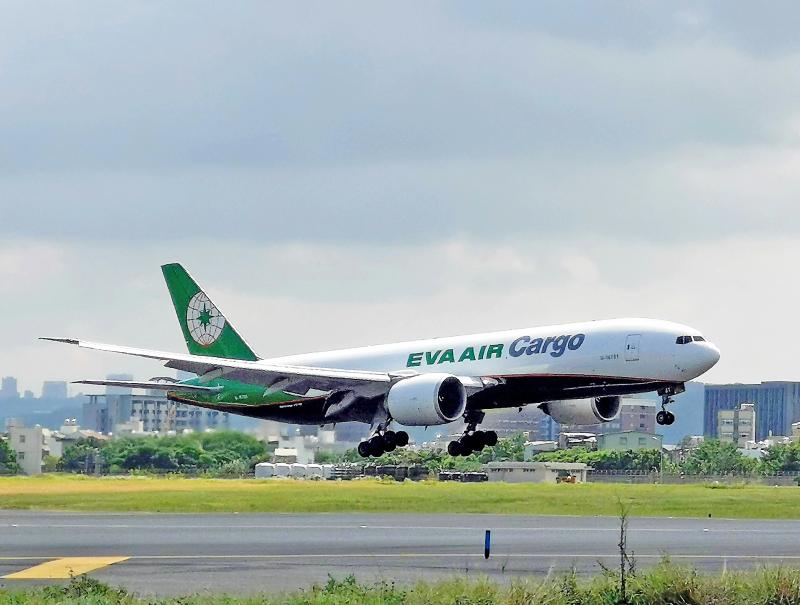EVA Airways Corp (長榮航空) and China Airlines Ltd (中華航空), the nation’s two major airlines, reported accelerated revenue growth in the third quarter compared with the previous two quarters, thanks to robust air cargo business.
EVA Airways yesterday said sales for last quarter rose 40 percent year-on-year to NT$25.81 billion (US$917 million), compared with an increase of 25 percent in the second quarter and a fall of 35 percent in the first quarter.
China Airlines said sales grew 39 percent to NT$34.6 billion in the third quarter, after gaining 10 percent in the second quarter and falling 14 percent in the first quarter.

Photo courtesy of Taoyuan International Airport Corp
EVA Airways said its cargo revenue totaled NT$20.58 billion in the third quarter, up 62 percent from NT$12.71 billion a year earlier, even though last month it had to halt its cargo service to Chicago as three of its pilots were infected with COVID-19.
The flight to Chicago was one of the airline’s busiest cargo routes with 22 flights a week before last month.
“The halt did not affect our cargo revenue, which still rose 64 percent last month, thanks to strong freight rates. The cargo business is forecast to continue booming this quarter,” an EVA Airways official said by telephone.
The airline’s passenger revenue rose in July and August, but retreated 16 percent year-on-year last month, due to lower demand and the suspension of flights to Chicago, the official said.
Overall, the airline’s passenger revenue totaled NT$2.47 billion last quarter, up 2 percent from a year earlier.
China Airlines said its cargo revenue hit a record of NT$11.68 billion last month, as it used more planes for flights to the US, which yield higher revenue.
In addition, cargo demand remained high, particularly shipments of fruit, electronic components and semiconductors, China Airlines said in a statement.
The cargo business is forecast to remain robust this quarter, which is the peak shopping season in Europe and North America, it said.

South Korea’s equity benchmark yesterday crossed a new milestone just a month after surpassing the once-unthinkable 5,000 mark as surging global memory demand powers the country’s biggest chipmakers. The KOSPI advanced as much as 2.6 percent to a record 6,123, with Samsung Electronics Co and SK Hynix Inc each gaining more than 2 percent. With the benchmark now up 45 percent this year, South Korea’s stock market capitalization has also moved past France’s, following last month’s overtaking of Germany’s. Long overlooked by foreign funds, despite being undervalued, South Korean stocks have now emerged as clear winners in the global market. The so-called “artificial intelligence

‘SEISMIC SHIFT’: The researcher forecast there would be about 1.1 billion mobile shipments this year, down from 1.26 billion the prior year and erasing years of gains The global smartphone market is expected to contract 12.9 percent this year due to the unprecedented memorychip shortage, marking “a crisis like no other,” researcher International Data Corp (IDC) said. The new forecast, a dramatic revision down from earlier estimates, gives the latest accounting of the ongoing memory crunch that is affecting every corner of the electronics industry. The demand for advanced memory to power artificial intelligence (AI) tasks has drained global supply until well into next year and jeopardizes the business model of many smartphone makers. IDC forecast about 1.1 billion mobile shipments this year, down from 1.26 billion the prior

People stand in a Pokemon store in Tokyo on Thursday. One of the world highest-grossing franchises is celebrated its 30th anniversary yesterday.

Chinese artificial intelligence (AI) start-up DeepSeek’s (深度求索) latest AI model, set to be released as soon as next week, was trained on Nvidia Corp’s most advanced AI chip, the Blackwell, a senior official of US President Donald Trump’s administration said on Monday, in what could represent a violation of US export controls. The US believes DeepSeek will remove the technical indicators that might reveal its use of American AI chips, the official said, adding that the Blackwells are likely clustered at its data center in Inner Mongolia, an autonomous region of China. The person declined to say how the US government received